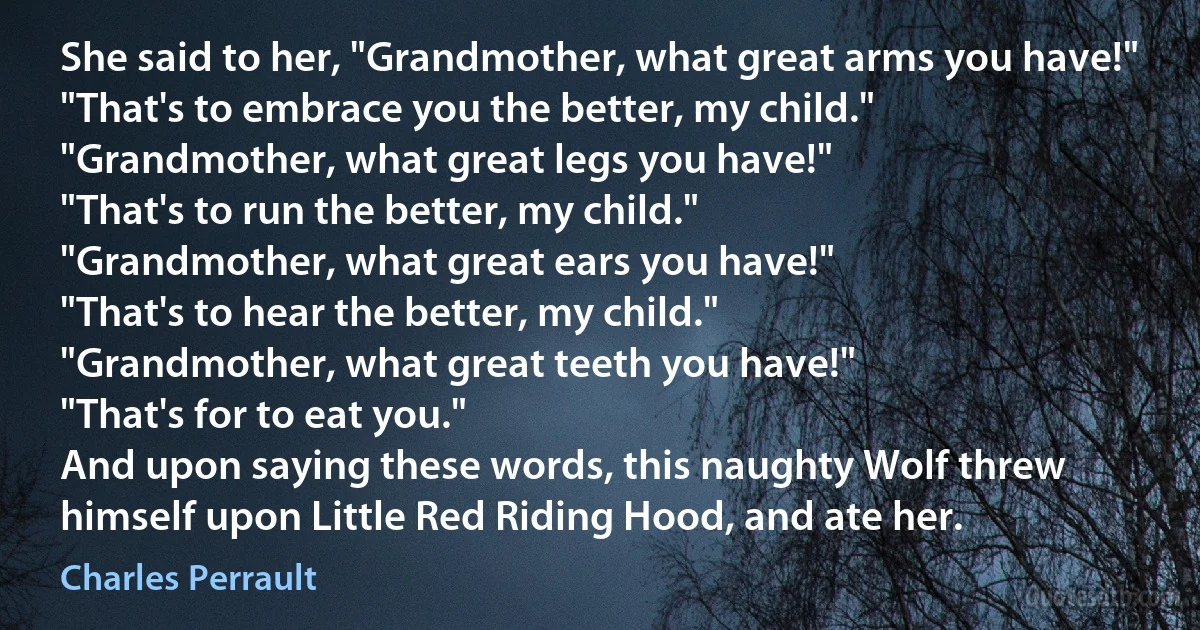Legs Quotes - page 7
Harry Dresden: There was a sound of impact, a raspy, dry scream, and the vampire went down hard. It lay on the ground like a butterfly pinned to a card, arms and legs thrashing uselessly. Its chest and collarbone had been crushed. By an entire frozen turkey. A twenty-pounder. The plucked bird must have fallen from an airplane overhead, doubtlessly manipulated by the curse. By the time it got to the ground, the turkey had already reached its terminal velocity, and was still hard as a brick. The drumsticks poked up above the vampire's crushed chest, their ends wrapped in red tinfoil. The vampire gasped and writhed a little more. The timer popped out of the turkey. Everyone stopped to blink at that for a second. I mean, come on. Impaled by a guided frozen turkey missile. Even by the standards of the quasi-immortal creatures of the night, that ain't something you see twice. "For my next trick," I panted into the startled silence, "anvils."

Jim Butcher
It is surprising that modern textbooks teach the ridiculous idea that birds are the descendents of dinosaurs! What a silly idea! There are many thousands of anatomical differences between reptiles and birds. Reptiles have four perfectly good legs that function just fine. Birds have two legs and two wings which also work fine as they are. If a reptile were to try to evolve into a bird, at some point it would have halfleg and half-wing. Now, it can no longer walk or run; yet, it cannot fly. This creature is doomed to extinction.

Kent Hovind
You know, everything about these feathered dinosaurs has been proven baloney. But guess what, they're still teaching it. [...] All this feathered dinosaur stuff is baloney. It's all baloney. [...] they say, "Birds are descendants of dinosaurs." Well, kids, in case you don't know, there are a few differences between a dinosaur and a bird. You don't just put a few feathers on them and say, "Come on, man, give it a try. It won't hurt too bad." It's just not that easy. See, reptiles have four perfectly good legs. Birds have two legs and two wings. So if his front legs are going to change to wings, somewhere along the line, they're going to be half-leg and half-wing. Which means, on that particular day, he can't run anymore, and he still can't fly yet, so he's got a real problem. A serious problem.

Kent Hovind
The boats, and trains, and cows and horses were quite meaningless to him, but not quite so baffling as the odd little figures which appeared beneath and between the colored pictures - some strange kind of bug he thought they might be, for many of them had legs though nowhere could he find one with eyes and a mouth. It was his first introduction to the letters of the alphabet, and he was over ten years old.

Edgar Rice Burroughs
...It is sad and discouraging that the reports of dear Leopold show no improvement, & I am sure it must be a worry to you. All one can say, is that one has tried all for the best, & one must bear in mind that possibly it may be some time still before he can use his legs properly after such repeated attacks & that paralysis...

Princess Beatrice of the United Kingdom
Dada is able to mobilize the optical and dimensional static viewpoint which keeps us imprisoned in our [three-dimensional] illusions. Thus it became possible t0 perceive the entire prism of the world instead of just one facet at a time. In this connection Dada is one of the strongest manifestations of the fourth dimension, transposed onto the subject.... Dada is 'yes-no', a bird on four legs, a ladder without steps, a square without angels. Dada possesses as many positives as negatives. To think that Dada simply means destruction is to misunderstand life, of which Dada is the expression.

Theo van Doesburg
But the projects with which the architects of Russian proletarian architecture present us are not only based on pure imagination, but their construction would, if they were fitted for realization, entail enormous waste of space and materials. The dwelling complex 'Wolkenbügel' [architecture, designed by Lissitzky, with the help of [ w:Emil Roth - Swiss architect, 1924] (assuming that one could live here without either freezing or melting!), shaped like a 4, stands in a very un-constructive way on three legs in which the elevators are located. The latter take up as much space as would one or more skyscrapers. And these 'architects' are to teach the West what architecture is!

Theo van Doesburg
Climbing the bole of the tree, a man clings with all his arms and legs, and lays hold of every knob and sliver. When he mounts amongst the branches, it should be with a more easy alacrity. A man will often be apt at the one operation, yet awkward at the other. Nor is it, indeed, common to meet with a man of such a character as can be carried from a low condition of life through successive ascents, with an aptitude for every condition into which he passes; and thus it is that men who rise well will often stand infirmly. But for want of due consideration being given to the nature of men and circumstances, it is a usual thing to hear, not only regret but surprise expressed, when a man who has attained an elevated position in life exhibits in that position those very defects of character through which he is there.

Henry Taylor
These big Texas interns kept saying, "Mrs. Kennedy, you come with us", they wanted to take me away from him... But I said "I'm not leaving"... Dave Powers came running to me at the hospital, crying when he saw me, my legs, my hands were covered with his brains... When Dave saw this he burst out weeping... I said "I'm not going to leave him, I'm not going to leave him"... I was standing outside in this narrow corridor... ten minutes later this big policeman brought me a chair.

Jacqueline Kennedy Onassis
Because you play football with your head, and your legs are there to help you. If you don't use your head, using your feet won't be sufficient. Why does a player have to chase the ball? Because he started running too late. You have to pay attention, use your brain and find the right position. If you get to the ball late, it means you chose the wrong position. Bergkamp was never late.

Johan Cruyff
If the neck of the giraffe elongates an inch at a time, then the full panoply of supporting structures need not arise at every step. The coordinated adaptation can be built piecemeal. Some animals may slightly elongate the neck, others the legs; still others may develop stronger neck muscles. By sexual reproduction, the favorable features of different organisms may be combined in offspring.

Stephen Jay Gould



